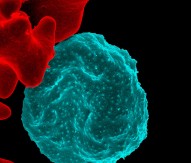
ERC funds halogen bonds and internet security projects
Two researchers at Germany’s Ruhr Universität Bochum have expressed their delight at receiving Starting Grants from the European Research Council.
Professor Dr Stefan M Huber will use his grant to pioneer the deployment of so-called ‘halogen bonds’ between catalysts and substrates for the manufacture of pharmaceutically effective molecules, whilst Professor Dr Thorsten Holz will centre his research on developing novel security mechanisms for the Internet of Things (IoT). Each researcher has received €1.5m in funding.
Talking about his forthcoming research project, Huber said: “Chiral compounds play a crucial role in the pharmaceutical industry: often, a chiral compound is the active drug component, whereas the mirror-image molecule exhibits no activity at all, or may even cause severe side effects.”
Whilst most catalysts to date have been based on the formation of complete chemical bonds between substrate and catalyst, metal complexes are commonly used. However, there are several disadvantages, i.e. toxicity and high cost. It was not until recently that weak (‘non-covalent’) interactions have been deployed in catalysis, however, hydrogen bonds have been virtually the only ones used so far.
Researchers aim utilise a barely used weak interaction for catalytic manufacture of chiral molecules for the first time: the halogen bonds are formed between halogen atoms with regions of positive polarity (especially bromine and iodine) and suitable substances. An important foundation of the project is the synthesis of promising catalyst candidates, whose activity the researchers plan to subsequently analyse in test reactions. Moreover, they plan to use such halogen bond-forming molecules for splitting the composites of two mirror-image compounds in their respective pure forms. Ultimately, they wish to expand this catalysis principle to other weak interactions that have barely been studied.
In the second project, Holz plans to improve security in the IoT. Under the umbrella of the project ‘Leveraging Binary Analysis to Secure the IoT – BASTION’, developers at the chair for system security are developing new analysis tools for software integrated in these devices, with the purpose of proactively finding potential vulnerabilities. In addition, they will design novel security mechanisms meant to protect such devices from attacks. A considerable challenge is making the new methods run on as many devices as possible, as different manufacturers leverage different hardware architectures; no analysis mechanisms exist at present that can be applied to a broad range of devices. Holz’s team aims to initially translate different software components into an intermediate language. Based on this intermediate language, new analysis and security mechanisms can be applied across all platforms.






